Emotional Intelligence: Definition, Models, and Key Components
VerifiedAdded on 2022/11/24
|8
|2070
|327
Essay
AI Summary
This essay provides a comprehensive overview of emotional intelligence (EQ) within the field of psychology. It defines EQ, explores its various models (Trait, Mixed, and Ability), and outlines the five key components: self-awareness, self-regulation, motivation, empathy, and social skills. The paper distinguishes EQ from intellectual intelligence (IQ), highlighting their differing skills, influencing factors, and modes of acquisition. It further discusses how EQ impacts relationships across various contexts, including family, school, and work, and suggests ways to enhance and cultivate EQ through social skills, self-awareness, emotional regulation, and empathy. The essay concludes by emphasizing the importance of EQ in both personal and professional life, asserting its equal significance to IQ in achieving life goals. This document is available on Desklib, a platform offering a wealth of academic resources for students.
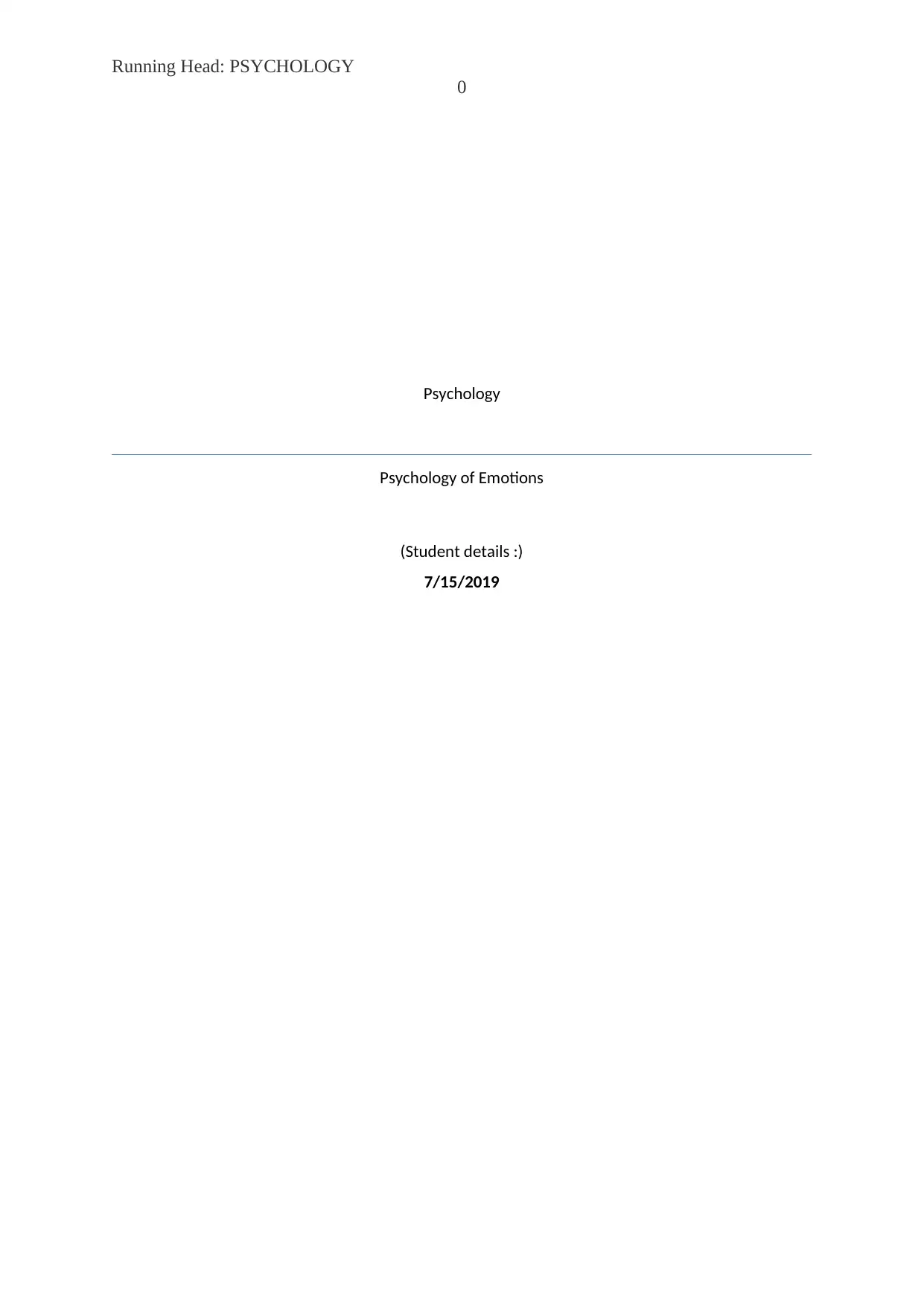
Running Head: PSYCHOLOGY
0
Psychology
Psychology of Emotions
(Student details :)
7/15/2019
0
Psychology
Psychology of Emotions
(Student details :)
7/15/2019
Paraphrase This Document
Need a fresh take? Get an instant paraphrase of this document with our AI Paraphraser
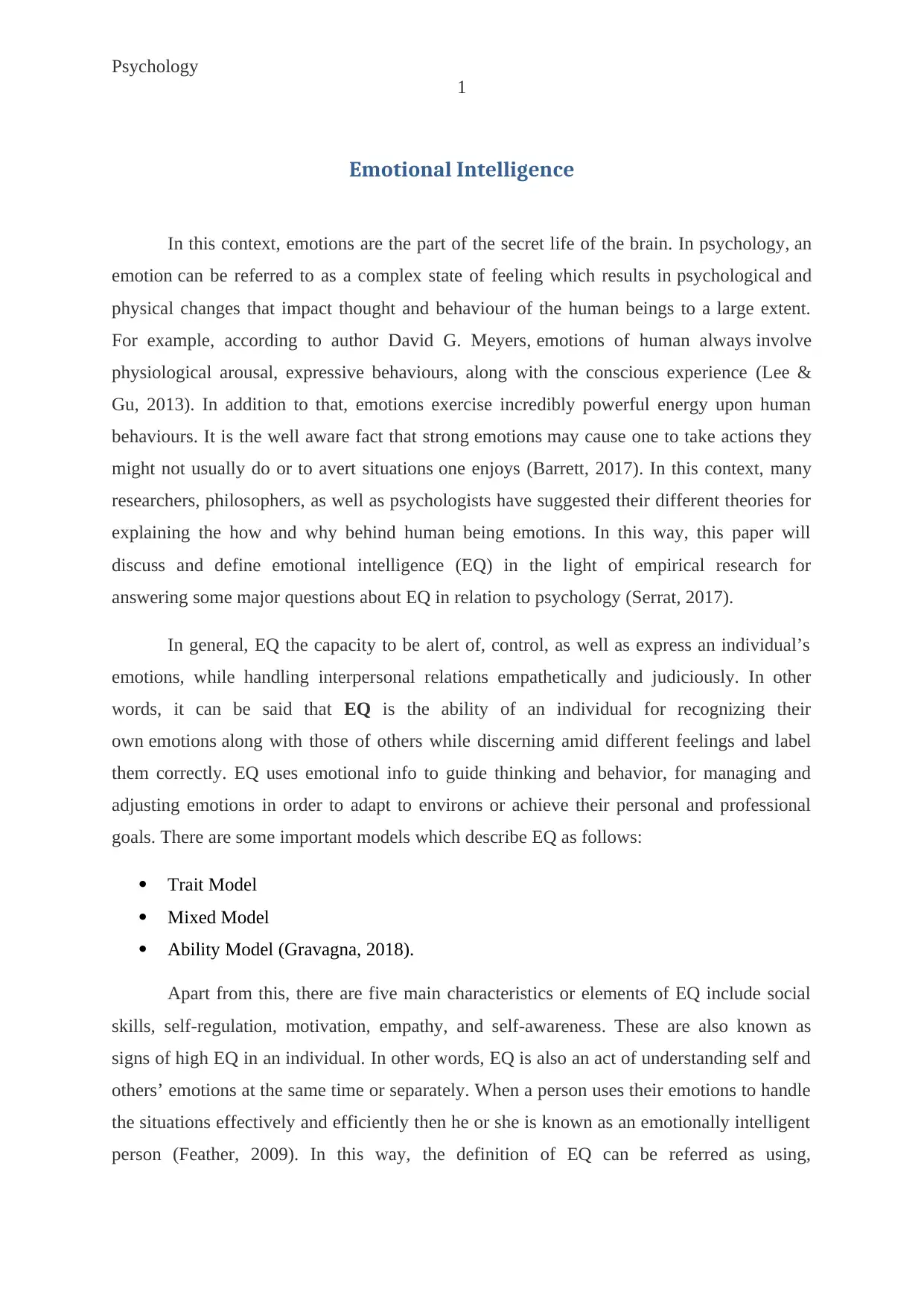
Psychology
1
Emotional Intelligence
In this context, emotions are the part of the secret life of the brain. In psychology, an
emotion can be referred to as a complex state of feeling which results in psychological and
physical changes that impact thought and behaviour of the human beings to a large extent.
For example, according to author David G. Meyers, emotions of human always involve
physiological arousal, expressive behaviours, along with the conscious experience (Lee &
Gu, 2013). In addition to that, emotions exercise incredibly powerful energy upon human
behaviours. It is the well aware fact that strong emotions may cause one to take actions they
might not usually do or to avert situations one enjoys (Barrett, 2017). In this context, many
researchers, philosophers, as well as psychologists have suggested their different theories for
explaining the how and why behind human being emotions. In this way, this paper will
discuss and define emotional intelligence (EQ) in the light of empirical research for
answering some major questions about EQ in relation to psychology (Serrat, 2017).
In general, EQ the capacity to be alert of, control, as well as express an individual’s
emotions, while handling interpersonal relations empathetically and judiciously. In other
words, it can be said that EQ is the ability of an individual for recognizing their
own emotions along with those of others while discerning amid different feelings and label
them correctly. EQ uses emotional info to guide thinking and behavior, for managing and
adjusting emotions in order to adapt to environs or achieve their personal and professional
goals. There are some important models which describe EQ as follows:
Trait Model
Mixed Model
Ability Model (Gravagna, 2018).
Apart from this, there are five main characteristics or elements of EQ include social
skills, self-regulation, motivation, empathy, and self-awareness. These are also known as
signs of high EQ in an individual. In other words, EQ is also an act of understanding self and
others’ emotions at the same time or separately. When a person uses their emotions to handle
the situations effectively and efficiently then he or she is known as an emotionally intelligent
person (Feather, 2009). In this way, the definition of EQ can be referred as using,
1
Emotional Intelligence
In this context, emotions are the part of the secret life of the brain. In psychology, an
emotion can be referred to as a complex state of feeling which results in psychological and
physical changes that impact thought and behaviour of the human beings to a large extent.
For example, according to author David G. Meyers, emotions of human always involve
physiological arousal, expressive behaviours, along with the conscious experience (Lee &
Gu, 2013). In addition to that, emotions exercise incredibly powerful energy upon human
behaviours. It is the well aware fact that strong emotions may cause one to take actions they
might not usually do or to avert situations one enjoys (Barrett, 2017). In this context, many
researchers, philosophers, as well as psychologists have suggested their different theories for
explaining the how and why behind human being emotions. In this way, this paper will
discuss and define emotional intelligence (EQ) in the light of empirical research for
answering some major questions about EQ in relation to psychology (Serrat, 2017).
In general, EQ the capacity to be alert of, control, as well as express an individual’s
emotions, while handling interpersonal relations empathetically and judiciously. In other
words, it can be said that EQ is the ability of an individual for recognizing their
own emotions along with those of others while discerning amid different feelings and label
them correctly. EQ uses emotional info to guide thinking and behavior, for managing and
adjusting emotions in order to adapt to environs or achieve their personal and professional
goals. There are some important models which describe EQ as follows:
Trait Model
Mixed Model
Ability Model (Gravagna, 2018).
Apart from this, there are five main characteristics or elements of EQ include social
skills, self-regulation, motivation, empathy, and self-awareness. These are also known as
signs of high EQ in an individual. In other words, EQ is also an act of understanding self and
others’ emotions at the same time or separately. When a person uses their emotions to handle
the situations effectively and efficiently then he or she is known as an emotionally intelligent
person (Feather, 2009). In this way, the definition of EQ can be referred as using,
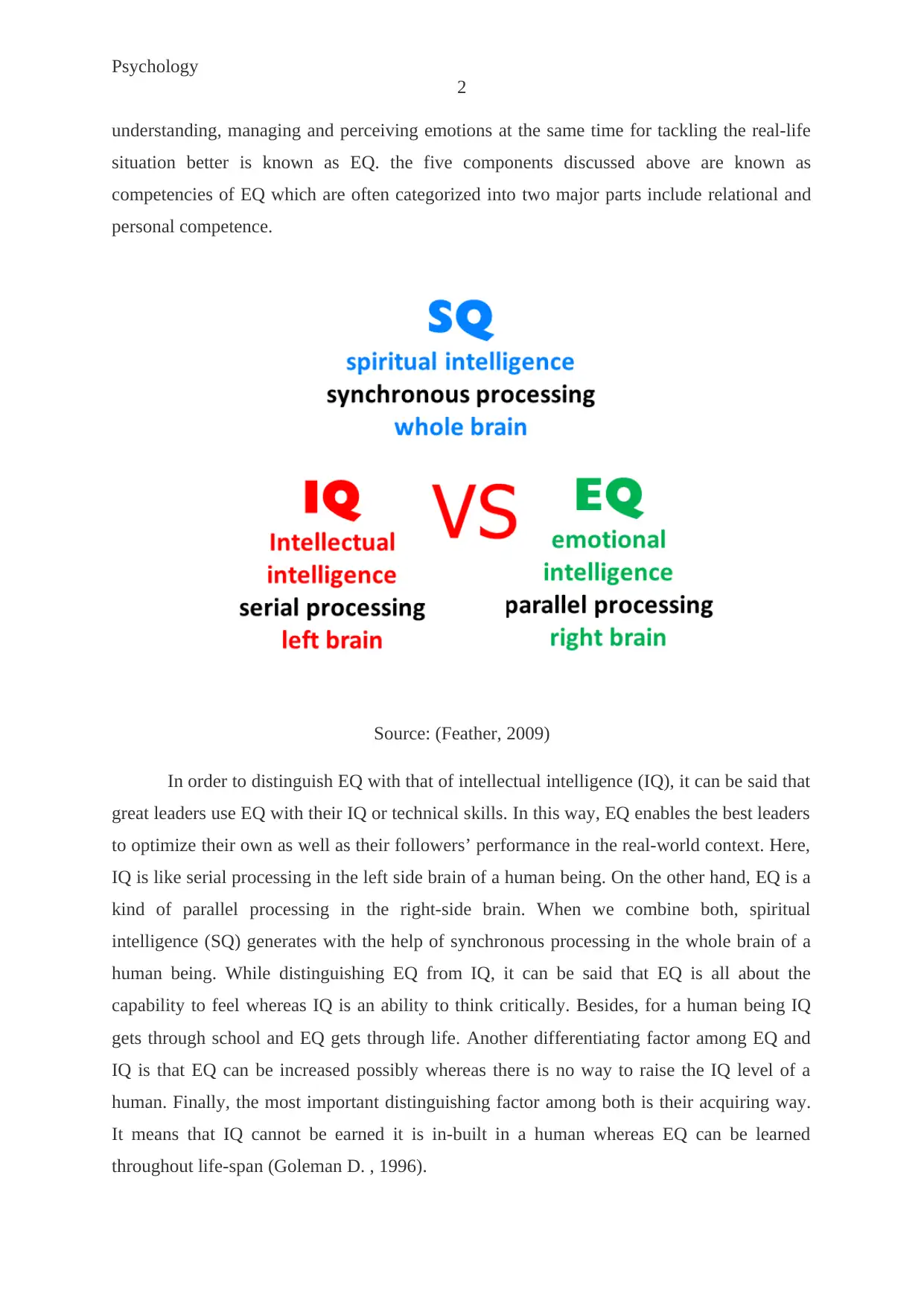
Psychology
2
understanding, managing and perceiving emotions at the same time for tackling the real-life
situation better is known as EQ. the five components discussed above are known as
competencies of EQ which are often categorized into two major parts include relational and
personal competence.
Source: (Feather, 2009)
In order to distinguish EQ with that of intellectual intelligence (IQ), it can be said that
great leaders use EQ with their IQ or technical skills. In this way, EQ enables the best leaders
to optimize their own as well as their followers’ performance in the real-world context. Here,
IQ is like serial processing in the left side brain of a human being. On the other hand, EQ is a
kind of parallel processing in the right-side brain. When we combine both, spiritual
intelligence (SQ) generates with the help of synchronous processing in the whole brain of a
human being. While distinguishing EQ from IQ, it can be said that EQ is all about the
capability to feel whereas IQ is an ability to think critically. Besides, for a human being IQ
gets through school and EQ gets through life. Another differentiating factor among EQ and
IQ is that EQ can be increased possibly whereas there is no way to raise the IQ level of a
human. Finally, the most important distinguishing factor among both is their acquiring way.
It means that IQ cannot be earned it is in-built in a human whereas EQ can be learned
throughout life-span (Goleman D. , 1996).
2
understanding, managing and perceiving emotions at the same time for tackling the real-life
situation better is known as EQ. the five components discussed above are known as
competencies of EQ which are often categorized into two major parts include relational and
personal competence.
Source: (Feather, 2009)
In order to distinguish EQ with that of intellectual intelligence (IQ), it can be said that
great leaders use EQ with their IQ or technical skills. In this way, EQ enables the best leaders
to optimize their own as well as their followers’ performance in the real-world context. Here,
IQ is like serial processing in the left side brain of a human being. On the other hand, EQ is a
kind of parallel processing in the right-side brain. When we combine both, spiritual
intelligence (SQ) generates with the help of synchronous processing in the whole brain of a
human being. While distinguishing EQ from IQ, it can be said that EQ is all about the
capability to feel whereas IQ is an ability to think critically. Besides, for a human being IQ
gets through school and EQ gets through life. Another differentiating factor among EQ and
IQ is that EQ can be increased possibly whereas there is no way to raise the IQ level of a
human. Finally, the most important distinguishing factor among both is their acquiring way.
It means that IQ cannot be earned it is in-built in a human whereas EQ can be learned
throughout life-span (Goleman D. , 1996).
⊘ This is a preview!⊘
Do you want full access?
Subscribe today to unlock all pages.

Trusted by 1+ million students worldwide
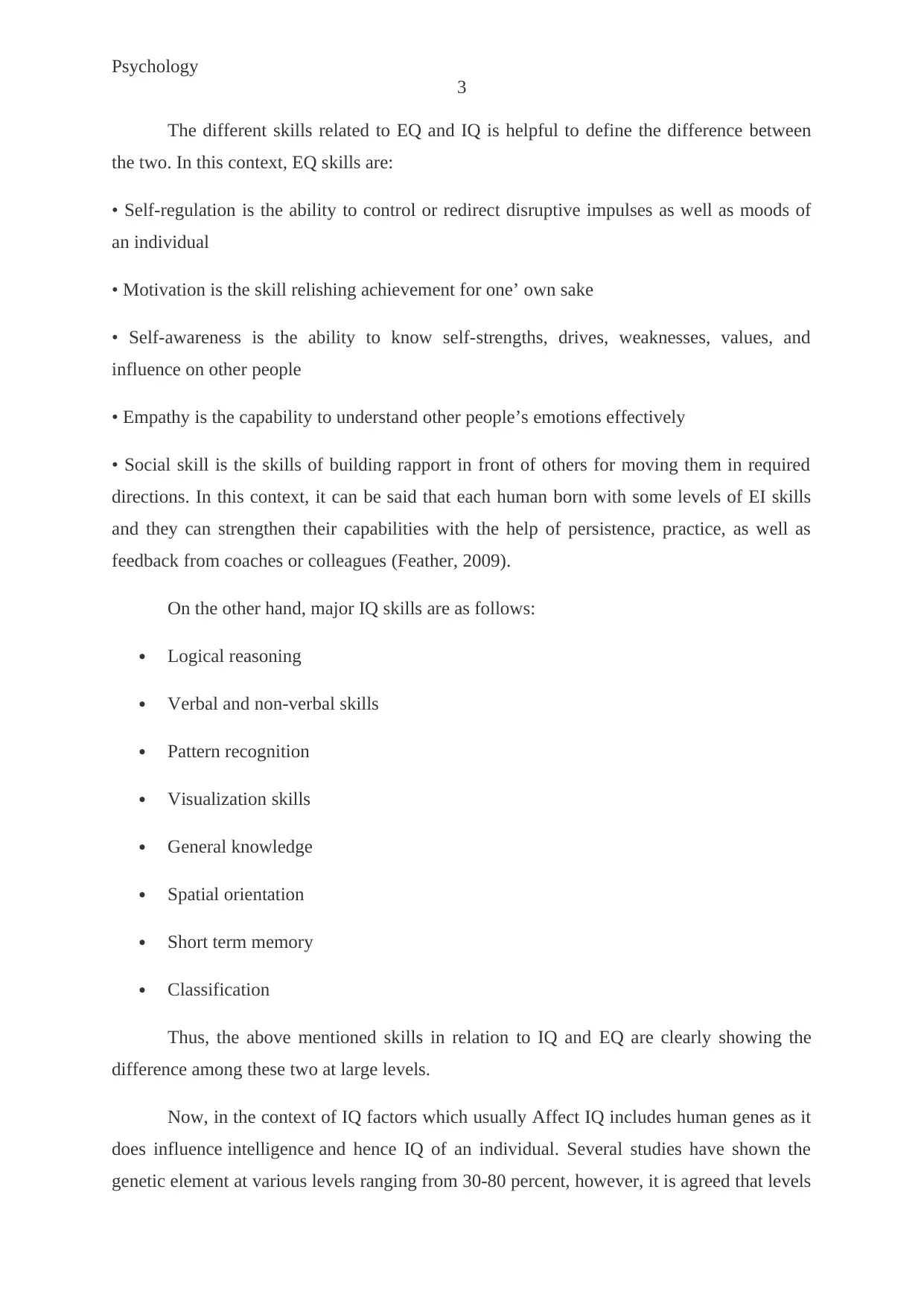
Psychology
3
The different skills related to EQ and IQ is helpful to define the difference between
the two. In this context, EQ skills are:
• Self-regulation is the ability to control or redirect disruptive impulses as well as moods of
an individual
• Motivation is the skill relishing achievement for one’ own sake
• Self-awareness is the ability to know self-strengths, drives, weaknesses, values, and
influence on other people
• Empathy is the capability to understand other people’s emotions effectively
• Social skill is the skills of building rapport in front of others for moving them in required
directions. In this context, it can be said that each human born with some levels of EI skills
and they can strengthen their capabilities with the help of persistence, practice, as well as
feedback from coaches or colleagues (Feather, 2009).
On the other hand, major IQ skills are as follows:
Logical reasoning
Verbal and non-verbal skills
Pattern recognition
Visualization skills
General knowledge
Spatial orientation
Short term memory
Classification
Thus, the above mentioned skills in relation to IQ and EQ are clearly showing the
difference among these two at large levels.
Now, in the context of IQ factors which usually Affect IQ includes human genes as it
does influence intelligence and hence IQ of an individual. Several studies have shown the
genetic element at various levels ranging from 30-80 percent, however, it is agreed that levels
3
The different skills related to EQ and IQ is helpful to define the difference between
the two. In this context, EQ skills are:
• Self-regulation is the ability to control or redirect disruptive impulses as well as moods of
an individual
• Motivation is the skill relishing achievement for one’ own sake
• Self-awareness is the ability to know self-strengths, drives, weaknesses, values, and
influence on other people
• Empathy is the capability to understand other people’s emotions effectively
• Social skill is the skills of building rapport in front of others for moving them in required
directions. In this context, it can be said that each human born with some levels of EI skills
and they can strengthen their capabilities with the help of persistence, practice, as well as
feedback from coaches or colleagues (Feather, 2009).
On the other hand, major IQ skills are as follows:
Logical reasoning
Verbal and non-verbal skills
Pattern recognition
Visualization skills
General knowledge
Spatial orientation
Short term memory
Classification
Thus, the above mentioned skills in relation to IQ and EQ are clearly showing the
difference among these two at large levels.
Now, in the context of IQ factors which usually Affect IQ includes human genes as it
does influence intelligence and hence IQ of an individual. Several studies have shown the
genetic element at various levels ranging from 30-80 percent, however, it is agreed that levels
Paraphrase This Document
Need a fresh take? Get an instant paraphrase of this document with our AI Paraphraser
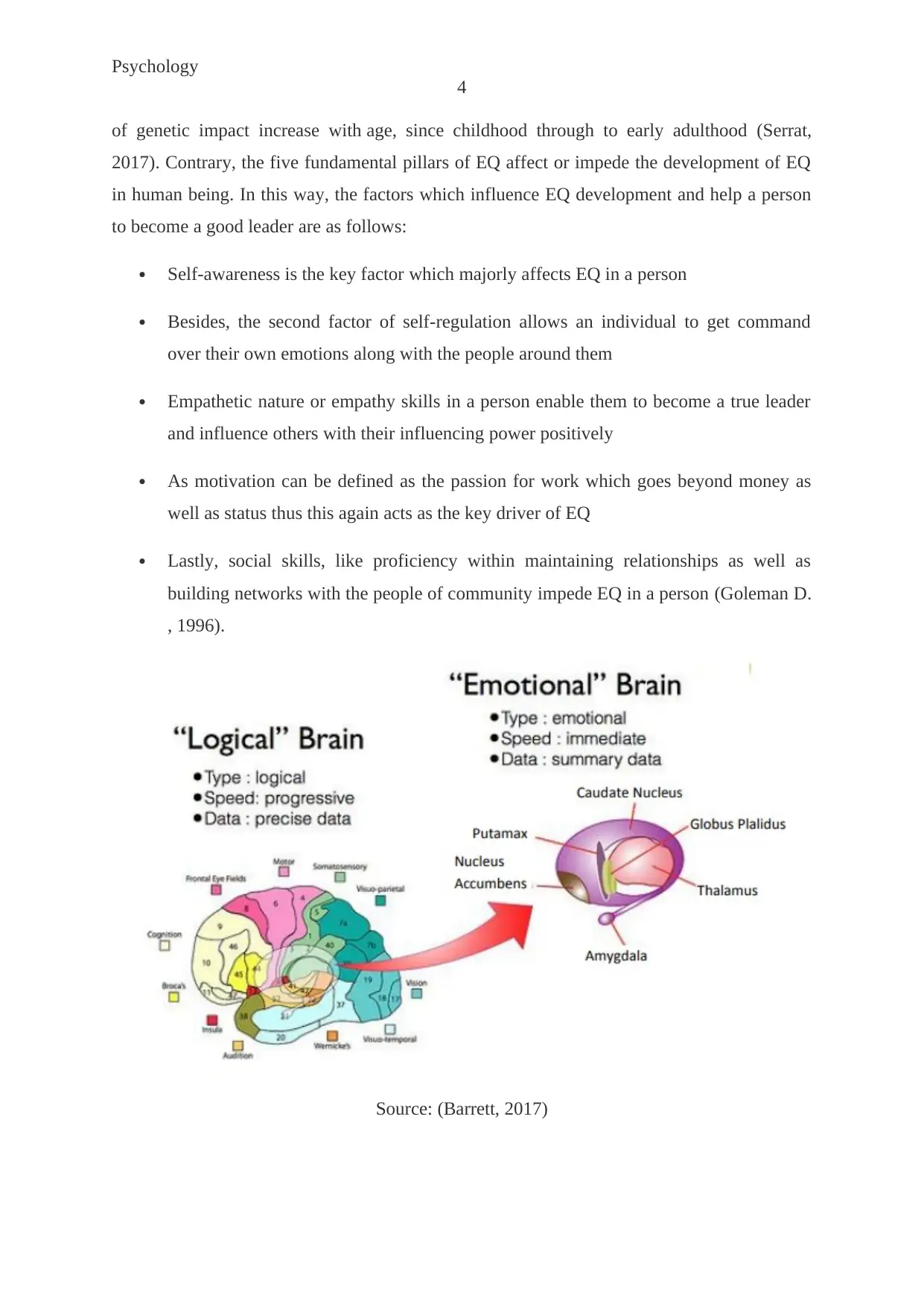
Psychology
4
of genetic impact increase with age, since childhood through to early adulthood (Serrat,
2017). Contrary, the five fundamental pillars of EQ affect or impede the development of EQ
in human being. In this way, the factors which influence EQ development and help a person
to become a good leader are as follows:
Self-awareness is the key factor which majorly affects EQ in a person
Besides, the second factor of self-regulation allows an individual to get command
over their own emotions along with the people around them
Empathetic nature or empathy skills in a person enable them to become a true leader
and influence others with their influencing power positively
As motivation can be defined as the passion for work which goes beyond money as
well as status thus this again acts as the key driver of EQ
Lastly, social skills, like proficiency within maintaining relationships as well as
building networks with the people of community impede EQ in a person (Goleman D.
, 1996).
Source: (Barrett, 2017)
4
of genetic impact increase with age, since childhood through to early adulthood (Serrat,
2017). Contrary, the five fundamental pillars of EQ affect or impede the development of EQ
in human being. In this way, the factors which influence EQ development and help a person
to become a good leader are as follows:
Self-awareness is the key factor which majorly affects EQ in a person
Besides, the second factor of self-regulation allows an individual to get command
over their own emotions along with the people around them
Empathetic nature or empathy skills in a person enable them to become a true leader
and influence others with their influencing power positively
As motivation can be defined as the passion for work which goes beyond money as
well as status thus this again acts as the key driver of EQ
Lastly, social skills, like proficiency within maintaining relationships as well as
building networks with the people of community impede EQ in a person (Goleman D.
, 1996).
Source: (Barrett, 2017)
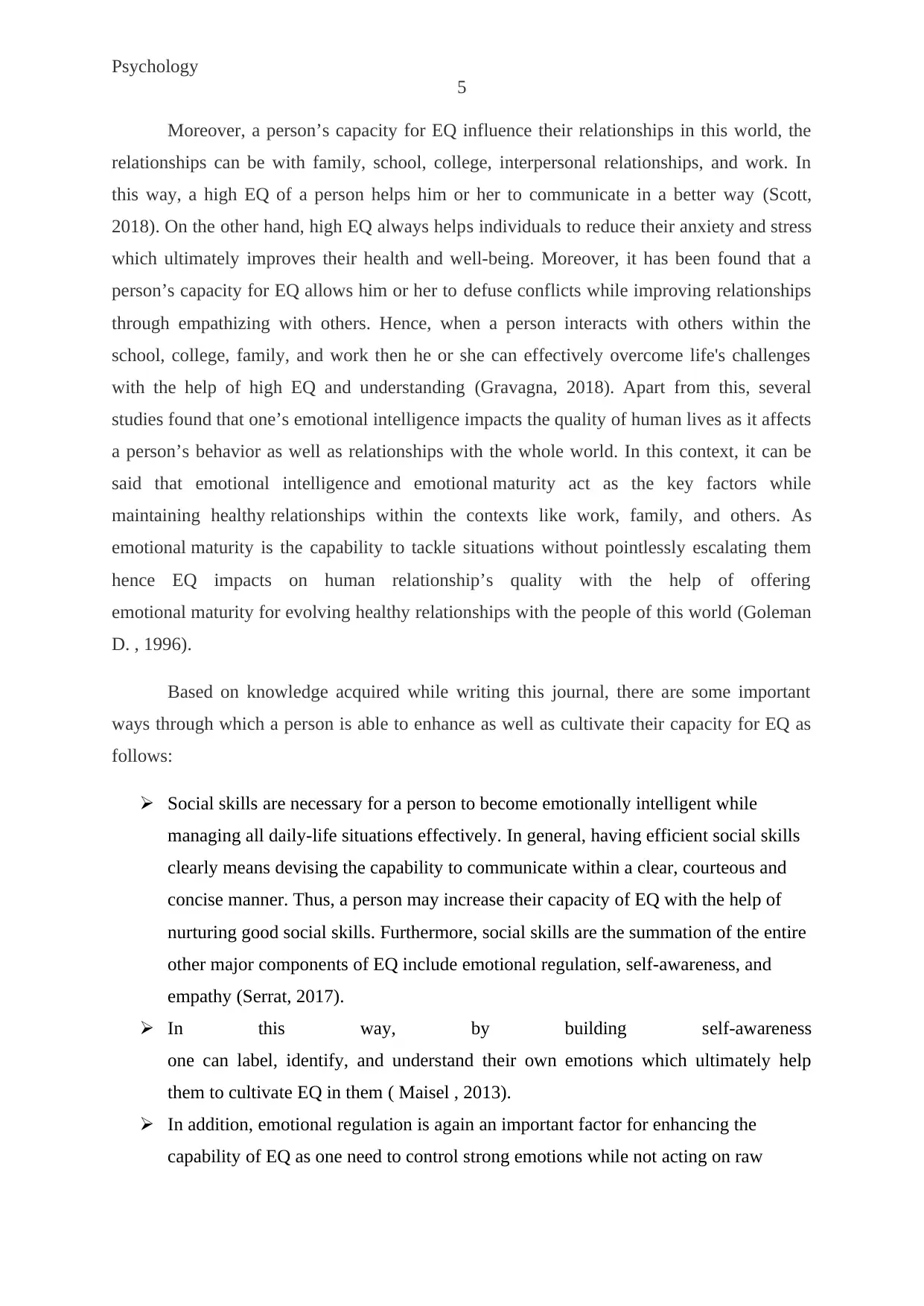
Psychology
5
Moreover, a person’s capacity for EQ influence their relationships in this world, the
relationships can be with family, school, college, interpersonal relationships, and work. In
this way, a high EQ of a person helps him or her to communicate in a better way (Scott,
2018). On the other hand, high EQ always helps individuals to reduce their anxiety and stress
which ultimately improves their health and well-being. Moreover, it has been found that a
person’s capacity for EQ allows him or her to defuse conflicts while improving relationships
through empathizing with others. Hence, when a person interacts with others within the
school, college, family, and work then he or she can effectively overcome life's challenges
with the help of high EQ and understanding (Gravagna, 2018). Apart from this, several
studies found that one’s emotional intelligence impacts the quality of human lives as it affects
a person’s behavior as well as relationships with the whole world. In this context, it can be
said that emotional intelligence and emotional maturity act as the key factors while
maintaining healthy relationships within the contexts like work, family, and others. As
emotional maturity is the capability to tackle situations without pointlessly escalating them
hence EQ impacts on human relationship’s quality with the help of offering
emotional maturity for evolving healthy relationships with the people of this world (Goleman
D. , 1996).
Based on knowledge acquired while writing this journal, there are some important
ways through which a person is able to enhance as well as cultivate their capacity for EQ as
follows:
Social skills are necessary for a person to become emotionally intelligent while
managing all daily-life situations effectively. In general, having efficient social skills
clearly means devising the capability to communicate within a clear, courteous and
concise manner. Thus, a person may increase their capacity of EQ with the help of
nurturing good social skills. Furthermore, social skills are the summation of the entire
other major components of EQ include emotional regulation, self-awareness, and
empathy (Serrat, 2017).
In this way, by building self-awareness
one can label, identify, and understand their own emotions which ultimately help
them to cultivate EQ in them ( Maisel , 2013).
In addition, emotional regulation is again an important factor for enhancing the
capability of EQ as one need to control strong emotions while not acting on raw
5
Moreover, a person’s capacity for EQ influence their relationships in this world, the
relationships can be with family, school, college, interpersonal relationships, and work. In
this way, a high EQ of a person helps him or her to communicate in a better way (Scott,
2018). On the other hand, high EQ always helps individuals to reduce their anxiety and stress
which ultimately improves their health and well-being. Moreover, it has been found that a
person’s capacity for EQ allows him or her to defuse conflicts while improving relationships
through empathizing with others. Hence, when a person interacts with others within the
school, college, family, and work then he or she can effectively overcome life's challenges
with the help of high EQ and understanding (Gravagna, 2018). Apart from this, several
studies found that one’s emotional intelligence impacts the quality of human lives as it affects
a person’s behavior as well as relationships with the whole world. In this context, it can be
said that emotional intelligence and emotional maturity act as the key factors while
maintaining healthy relationships within the contexts like work, family, and others. As
emotional maturity is the capability to tackle situations without pointlessly escalating them
hence EQ impacts on human relationship’s quality with the help of offering
emotional maturity for evolving healthy relationships with the people of this world (Goleman
D. , 1996).
Based on knowledge acquired while writing this journal, there are some important
ways through which a person is able to enhance as well as cultivate their capacity for EQ as
follows:
Social skills are necessary for a person to become emotionally intelligent while
managing all daily-life situations effectively. In general, having efficient social skills
clearly means devising the capability to communicate within a clear, courteous and
concise manner. Thus, a person may increase their capacity of EQ with the help of
nurturing good social skills. Furthermore, social skills are the summation of the entire
other major components of EQ include emotional regulation, self-awareness, and
empathy (Serrat, 2017).
In this way, by building self-awareness
one can label, identify, and understand their own emotions which ultimately help
them to cultivate EQ in them ( Maisel , 2013).
In addition, emotional regulation is again an important factor for enhancing the
capability of EQ as one need to control strong emotions while not acting on raw
⊘ This is a preview!⊘
Do you want full access?
Subscribe today to unlock all pages.

Trusted by 1+ million students worldwide
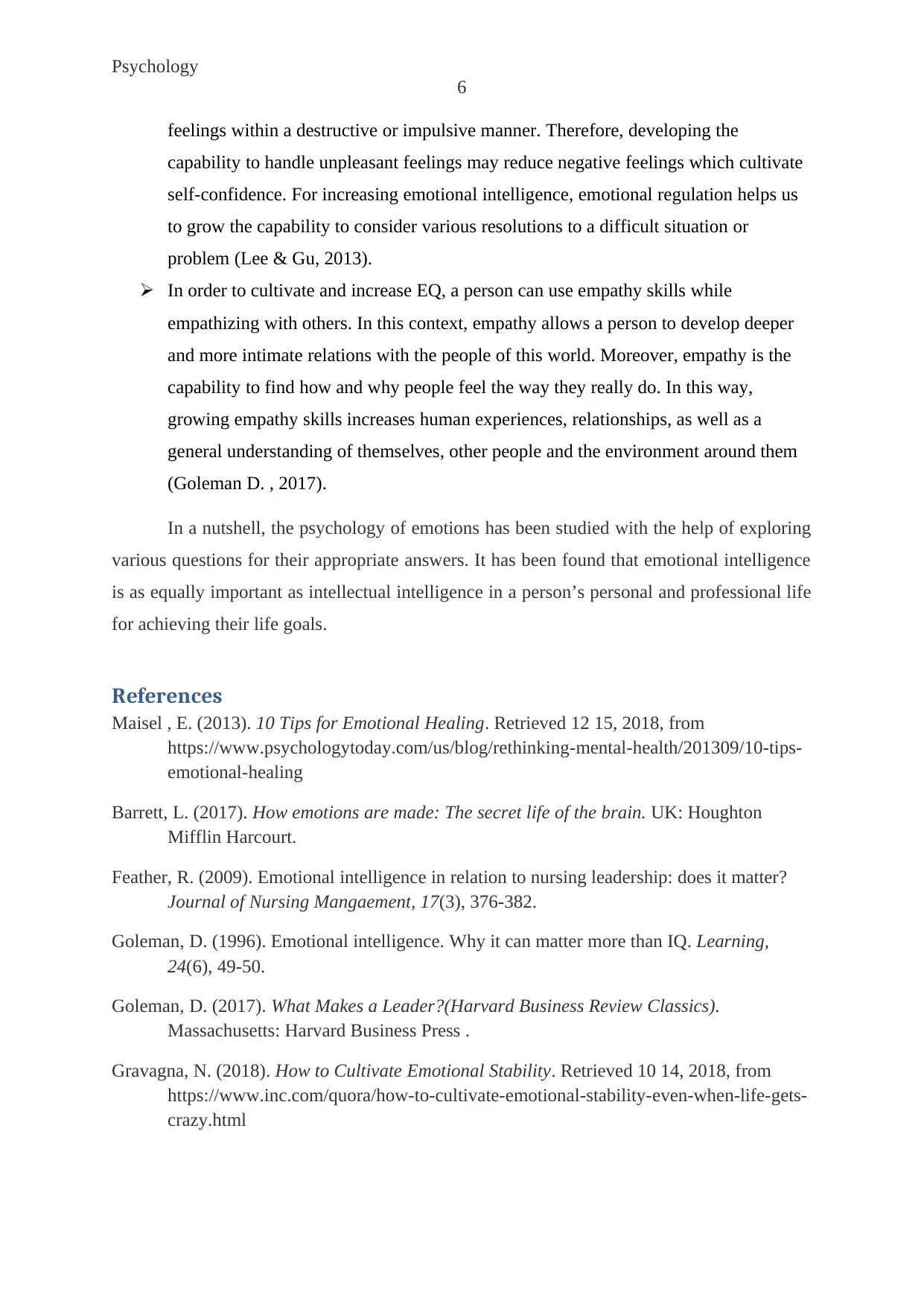
Psychology
6
feelings within a destructive or impulsive manner. Therefore, developing the
capability to handle unpleasant feelings may reduce negative feelings which cultivate
self-confidence. For increasing emotional intelligence, emotional regulation helps us
to grow the capability to consider various resolutions to a difficult situation or
problem (Lee & Gu, 2013).
In order to cultivate and increase EQ, a person can use empathy skills while
empathizing with others. In this context, empathy allows a person to develop deeper
and more intimate relations with the people of this world. Moreover, empathy is the
capability to find how and why people feel the way they really do. In this way,
growing empathy skills increases human experiences, relationships, as well as a
general understanding of themselves, other people and the environment around them
(Goleman D. , 2017).
In a nutshell, the psychology of emotions has been studied with the help of exploring
various questions for their appropriate answers. It has been found that emotional intelligence
is as equally important as intellectual intelligence in a person’s personal and professional life
for achieving their life goals.
References
Maisel , E. (2013). 10 Tips for Emotional Healing. Retrieved 12 15, 2018, from
https://www.psychologytoday.com/us/blog/rethinking-mental-health/201309/10-tips-
emotional-healing
Barrett, L. (2017). How emotions are made: The secret life of the brain. UK: Houghton
Mifflin Harcourt.
Feather, R. (2009). Emotional intelligence in relation to nursing leadership: does it matter?
Journal of Nursing Mangaement, 17(3), 376-382.
Goleman, D. (1996). Emotional intelligence. Why it can matter more than IQ. Learning,
24(6), 49-50.
Goleman, D. (2017). What Makes a Leader?(Harvard Business Review Classics).
Massachusetts: Harvard Business Press .
Gravagna, N. (2018). How to Cultivate Emotional Stability. Retrieved 10 14, 2018, from
https://www.inc.com/quora/how-to-cultivate-emotional-stability-even-when-life-gets-
crazy.html
6
feelings within a destructive or impulsive manner. Therefore, developing the
capability to handle unpleasant feelings may reduce negative feelings which cultivate
self-confidence. For increasing emotional intelligence, emotional regulation helps us
to grow the capability to consider various resolutions to a difficult situation or
problem (Lee & Gu, 2013).
In order to cultivate and increase EQ, a person can use empathy skills while
empathizing with others. In this context, empathy allows a person to develop deeper
and more intimate relations with the people of this world. Moreover, empathy is the
capability to find how and why people feel the way they really do. In this way,
growing empathy skills increases human experiences, relationships, as well as a
general understanding of themselves, other people and the environment around them
(Goleman D. , 2017).
In a nutshell, the psychology of emotions has been studied with the help of exploring
various questions for their appropriate answers. It has been found that emotional intelligence
is as equally important as intellectual intelligence in a person’s personal and professional life
for achieving their life goals.
References
Maisel , E. (2013). 10 Tips for Emotional Healing. Retrieved 12 15, 2018, from
https://www.psychologytoday.com/us/blog/rethinking-mental-health/201309/10-tips-
emotional-healing
Barrett, L. (2017). How emotions are made: The secret life of the brain. UK: Houghton
Mifflin Harcourt.
Feather, R. (2009). Emotional intelligence in relation to nursing leadership: does it matter?
Journal of Nursing Mangaement, 17(3), 376-382.
Goleman, D. (1996). Emotional intelligence. Why it can matter more than IQ. Learning,
24(6), 49-50.
Goleman, D. (2017). What Makes a Leader?(Harvard Business Review Classics).
Massachusetts: Harvard Business Press .
Gravagna, N. (2018). How to Cultivate Emotional Stability. Retrieved 10 14, 2018, from
https://www.inc.com/quora/how-to-cultivate-emotional-stability-even-when-life-gets-
crazy.html
Paraphrase This Document
Need a fresh take? Get an instant paraphrase of this document with our AI Paraphraser

Psychology
7
Lee, O., & Gu, M. (2013). The relationship between emotional intelligence and
communication skill, clinical competence & clinical practice stress in nursing
students. Journal of the Korea Academia-Industrial Cooperation Society, 14(6), 2749-
2759.
Scott, E. (2018). 5 Ways to Cope with Emotional Stress. Retrieved 12 15, 2018, from
https://www.verywellmind.com/coping-with-emotional-stress-3144565
Serrat, O. (2017). Understanding and developing emotional intelligence. Singapore: Springer.
7
Lee, O., & Gu, M. (2013). The relationship between emotional intelligence and
communication skill, clinical competence & clinical practice stress in nursing
students. Journal of the Korea Academia-Industrial Cooperation Society, 14(6), 2749-
2759.
Scott, E. (2018). 5 Ways to Cope with Emotional Stress. Retrieved 12 15, 2018, from
https://www.verywellmind.com/coping-with-emotional-stress-3144565
Serrat, O. (2017). Understanding and developing emotional intelligence. Singapore: Springer.
1 out of 8
Related Documents
Your All-in-One AI-Powered Toolkit for Academic Success.
+13062052269
info@desklib.com
Available 24*7 on WhatsApp / Email
![[object Object]](/_next/static/media/star-bottom.7253800d.svg)
Unlock your academic potential
Copyright © 2020–2026 A2Z Services. All Rights Reserved. Developed and managed by ZUCOL.




